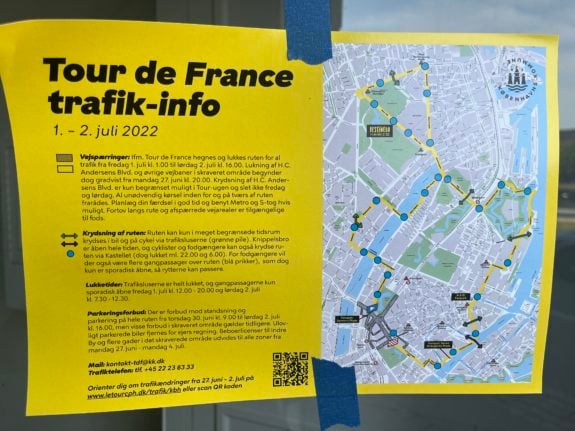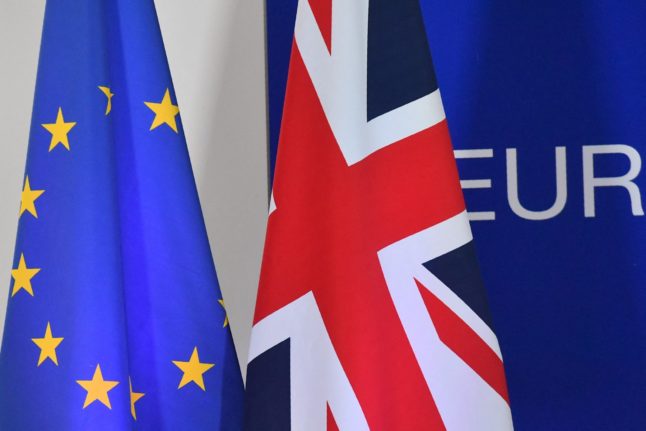The race will begin in Copenhagen and spend several days in Denmark crossing islands before riders will be transferred back to France for the race to continue from the north east of the country.
The Tour usually includes at least one stage outside France, but Covid travel restrictions meant the 2021 race was held entirely in France, apart from a brief trip into the neighbouring micro-state of Andorra.
Copenhagen was originally scheduled to host the 2021 Grand Départ.
The race usually starts on a Saturday, but this year will begin on Friday, July 1st, in order to allow time for the rest days and transfer of all teams back from Denmark to France.
READ ALSO: MAP: What you need to know about the 2022 Tour de France (and Denmark)
The Danish portion of the tour is as follows:
Stage 1 – July 1st
Copenhagen – Copenhagen – 13km (time trial)
Stage 2 – July 2nd
Roskilde – Nyborg – 199km
Stage 3 – July 3rd
Vejle – Sønderborg – 182km
Stage 1: Copenhagen
Friday July 1st sees a short 13 kilometre time trial on the streets of Copenhagen mark the beginning of the Grand Depart. Some road closures can be expected as early as Monday June 27th and throughout the week leading up to the event as the city prepares for the arrival of the Tour. As such, both traffic and parking may be congested.
The central H.C. Andersens Boulevard will be closed to traffic with parking areas blocked off in the start and finish area of the route. These closures will be in place from June 27th until Monday July 4th at 5am.
The route of the time trial itself will be closed to traffic from the early hours of July 1st, while parking will not be permitted on the route from the morning of the preceding day, Thursday June 30th.
Here are the 3 Danish stages for @letourdk in 2021! We are so excited to show some of the most beautiful areas of Denmark for the whole world. The @LeTour in 2021 will be an amazing race and an celebretion for everyone. 🥳🚴🏻♂️🚴🏻♂️✌🏻@FrankJensenKBH @amaurysport @ctricartour pic.twitter.com/GdMdmjcP9Q
— Grand Départ 2022 🇩🇰 (@letourdk) February 4, 2020
Spectators and residents in Copenhagen are therefore asked to use public transportation to both access and travel within the city. It will not be possible to drive into central Copenhagen.
Normal traffic is expected from Monday July 4th.
Stage 2: Roskilde – Nyborg
Saturday July 2nd will see the Tour cross Zealand and eventually make its way to the island of Funen across the Great Belt Bridge.
The following municipalities can expect traffic and delays throughout the day, with motorists advised to check their routes and leave early if necessary: Roskilde, Lejre, Odsherred, Holbæk, Kalundborg, Korsør and Nyborg.
Local information about road closures during the Tour de France can be found via the relevant municipality websites. Here is the page for Roskilde, for example.
Detailed information about the second stage can be found on the race organiser’s website.
The Great Belt Bridge will be closed completely to cars from 1pm to 6pm on July 2nd, with adjacent motorway sections closing at 12:30 pm. The motorway will be closed between the Nyborg V (Funen) and Slagelse V (Zealand) junctions.
Motorists are therefore strongly advised to avoid travelling between east and west Denmark on July 2nd and to instead plan their journeys for Thursday, Friday or Sunday. Rail traffic across the bridge will not be affected, however.
Ferry connections between Jutland and Zealand, such as those from Aarhus and Ebeltoft to Sjællands Odde, are expected to book up early for July 2nd.
READ ALSO: Denmark warned of traffic and airport congestion as school holidays begin
Stage 3: Vejle – Sønderborg
Fjord city Vejle, with its steep roads and hilly countryside, will challenge the riders on stage 3 before they head south towards Sønderborg near the German border. Both towns can expect considerable queuing and extended journey times.
Passengers travelling through Billund Airport should allow extra travel time on July 3rd due to possible delays linked to the road closures and congestion around Vejle.
In addition to Vejle and Sønderborg, the Kolding, Haderslev and Aabenraa municipalities will all have road closures to make way for the Tour competitors.
Local information about road closures during the Tour de France can be found via the relevant municipality websites. Here is the page for Vejle, for example.
More information about the third stage of the Tour can be found here.



 Please whitelist us to continue reading.
Please whitelist us to continue reading.
Member comments